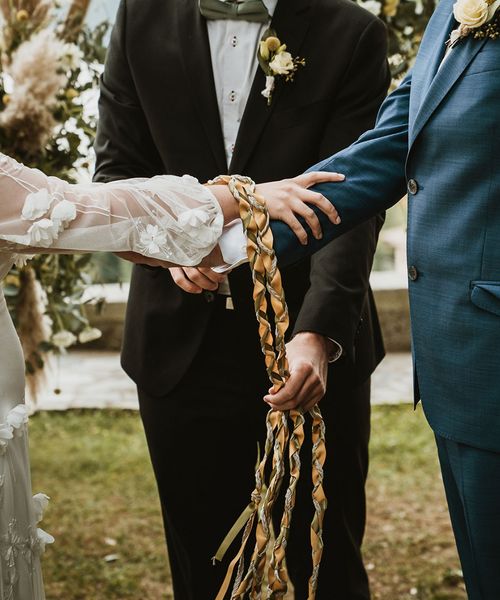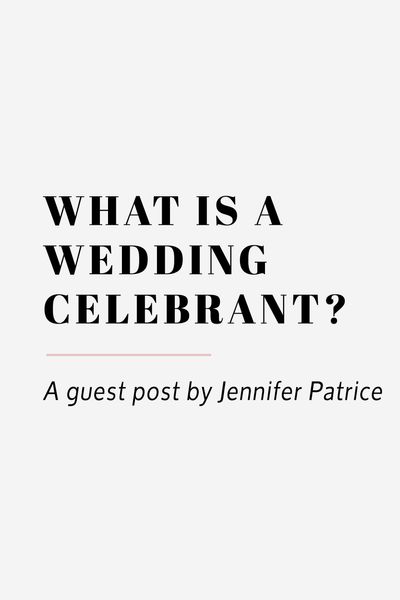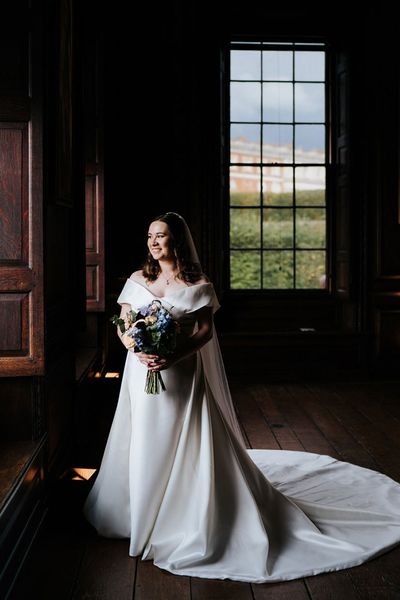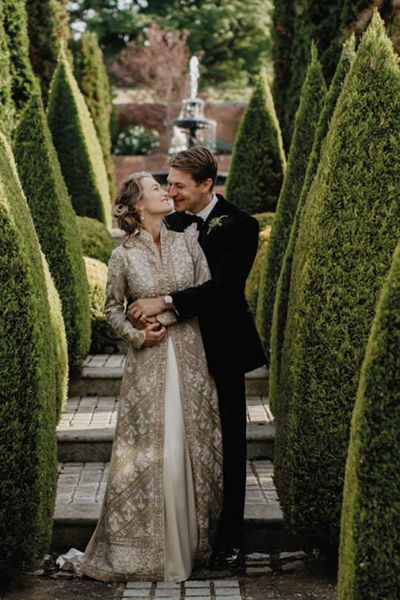
What is a Handfasting Ceremony?
Photography by Benni Carol PhotographyHave you ever heard of a handfasting ceremony? If you haven't, don't fret. Considering the first recorded wedding was in Mesopotamia in 2350 B.C., there is an enormous abundance of wedding traditions and symbols. That's a lot to remember! Luckily for you, though, we're going to be diving into the meaning of the handfasting ceremony. What it is, where it came from, and how to do it. Woohoo!
What is a handfasting ceremony?
Although dating back over 2000 years, handfasting ceremonies have become increasingly popular. Couples nowadays are looking for ways to include symbolism in their ceremony. Good on them! A handfasting ceremony is an ancient Celtic tradition and symbolises the binding of two lives. This symbolism is portrayed by the couples' hands being bound together by a cord. Tie the knot much? Once the hands are tied, words are then recited that express commitment and unity. Originally, this ritual was actually for engagements, rather than weddings. The act acknowledged the engagement and willingness to stay together, which usually went on for about a year.
Today, these ceremonies are found in spiritual, secular, and even Christian ceremonies. The ceremony is either wiggled into the wedding somehow, or it's the main event itself. It essentially depends on the couple, and how big a part they want the symbolism to play.



Why should I choose this for my wedding?
Weddings, especially in recent years, have become incredibly personable. Many couples feel that more traditional-leaning weddings can be restrictive. Or maybe, they don't really reflect who they are, or what marriage means to them. A handfasting ceremony is a great way to acknowledge your unity, and connection and to add intimacy. However, other people like to salute the ancient tradition itself.


Who can conduct the ceremony?
The conductor of a handfasting ceremony is entirely dependent on the couple's wishes. You can find someone who is well versed in handfasting, ask your celebrant to do it, or even ask your family/friends. Back in ancient Celtic times, it was a druid priest who would conduct it. We realise it may be slightly difficult to find one of those these days... So your celebrant or a family member will do just fine.


What should be said during the ceremony?
Even though the tradition has been around for some time, a lot of people are probably unsure as to what a handfasting ceremony is. That's why it might be beneficial to start off with an explanation of it. What it is, where it came from, and why you have decided to include it. In terms of things expressed during the ceremony, it's pretty much up to you. See what works! And think about why you decided to incorporate the ceremony. If it was for symbolism, what is it you want to be symbolised? What do you want your partner to know, whilst being bound to you? You could opt for saying a few things before the beginning of the ritual. A lot of couples decide to say their vows whilst being bound. If there are multiple handfasting cords, some couples choose to exchange a different vow for each different cord.


How long should you remain bound?
Again, it's essentially up to you. Traditionally, the couple would be tied together until MIDNIGHT! They must have been pretty close... Of course, though, you can take it off whenever you want. Whether it's right after the ceremony, or keep it on throughout the day, if you're feeling adventurous. One thing to remember is that when you do decide to take off the handfasting ceremony ribbon, try to keep the actual tie intact. You can then do what you want with it! Take it home, take a picture, put it around a tree branch... the world is your handfasting oyster.


I'm interested! How do I go about doing a handfasting ceremony?
After explaining the ceremony to your guests, the idea of binding lives together should be emphasised. Whoever is orchestrating the ritual then invites the couple to join hands. They then read vows, as the ribbons/cords are wrapped around the couple's hands. After hands are bound, you can exchange additional vows if needs or wants be. The officiant/celebrant/etc. closes it up by talking about the completion of the handfasting and binding, and the symbolisation of commitment and unity.



There we have it - a brief whizz-through of what a handfasting ceremony is. If you want to see the ceremony in action, then look no further. Megan and Josh's handfasting ceremony in Scotland Woodland is a great source of inspiration. Vicky & Aaron also opted for the ritual at their glamping wedding.






